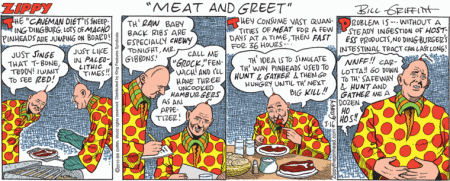In a comment on my “Dilating eye teeth” posting, Ron Hardin noted a wonderful story from the Onion, beginning:
Increasing Number of Parents Opting To Have Children School-Homed
WASHINGTON—According to a report released Monday by the U.S. Department of Education, an increasing number of American parents are choosing to have their children raised at school rather than at home.
Deputy Education Secretary Anthony W. Miller said that many parents who school-home find U.S. households to be frightening, overwhelming environments for their children, and feel that they are just not conducive to producing well-rounded members of society.
[from here, though available from many sources]
A play on the verb home-school ‘to school (children) at home’, with the two nouns exchanged — to yield a verb that doesn’t quite mean ‘to home (children) at school’, but rather ‘to raise (children) at school’, raising children being something that’s conventionally done at home.
The verb home-school (OED draft of December 2004: ‘to educate (a child, esp. one’s own) in the home’, as a transitive and also as an intransitive with an understood object, as in “You don’t have to be a qualified teacher to home-school”) is relatively recent, with OED cites only from 1981. It’s a conversion of some kind — either a back-formation from the synthetic compound home-schooling or a direct verbing from the noun-noun compound home school, both possible sources going back to the 19th century.
In the 2004 OED entries, the compound home school (‘a school located in a private home; the fact of educating children, esp. one’s own, in the home’) is the older of the two, with cites from 1850. The cites for the compound home schooling (‘the action of teaching, or the fact of being taught, at home, esp. by one’s parents; education of a child by his or her parents’) go back to 1899. (In fact, the OED relates the synthetic compound to the noun-noun compound.)
(Along with the verb home-school, there is another relatively recent item, the synthetic compound home-schooler, with two senses: ‘a child who is educated at home’, from 1981; ‘a parent (or occas. another person) who teaches children at home’, from 1984.)







